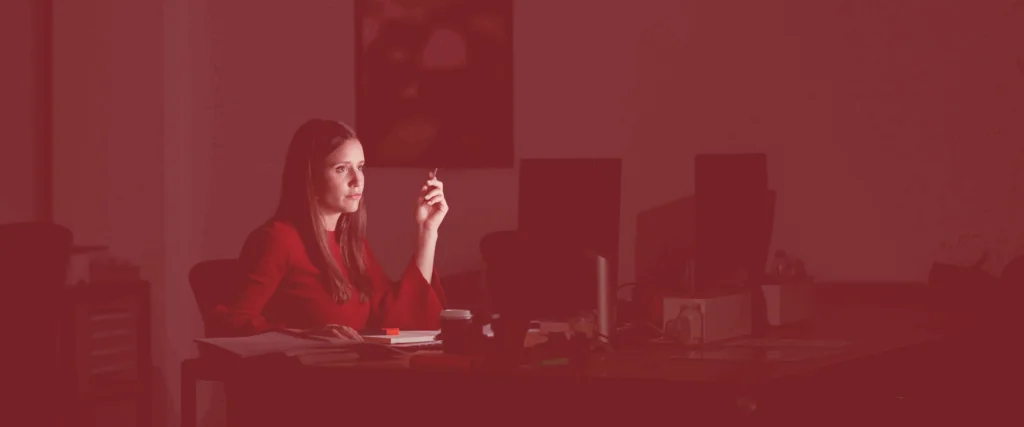Q&A: What’s next for the workplace with Isabel Berwick

At FT Longitude’s recent event on the future of work, Isabel Berwick, Host and Editor of the ‘Working It’ newsletter from the Financial Times sat down with Sean Kearns, Director of Strategy and Innovation at FT Longitude to talk about how the world of work is changing, and how leaders can keep up. Watch the highlights here.
Hi Isabel, you recently made a great video for the FT where you went out to the US west coast and interviewed leaders about AI and the future of work – what are the trends in this area that we should be aware of?
The feeling around AI has gone from “it’s coming for all of our jobs” to “we’re all really excited about it”. And I think the words I hear most associated with AI at the moment, are ‘human centered’. It’s all about the people.
If you watch the video, our AI editor, Madhumita Murgia, talks about how companies are going all in on very expensive software purchases. But actually we don’t really know what they’re spending the money on, and quite a lot of the staff aren’t coming with them. I guess there’s a feeling of “maybe we should slow down a bit” coming down the pipe.
The most startling statistic I’ve heard recently is that two thirds of desk workers haven’t used AI, and quite a lot of the ones that do use AI are bringing their own AI to work. So we’re not bringing ourselves to work anymore, we’re bringing our own AI on our phones.
The implications of that are coming through: more guardrails, and much more caution. But there’s also an optimism around it, in that it could make our workplaces better.
Another area you’ve covered on Working It is AI and recruitment. What are you hearing from leaders on this topic?
What I hear from leaders is quite different from what I hear from people who are trying to get jobs. I have a daughter who’s 24 and my son is 21. Most of their friends are working in bars and cafes. No one can get a job unless you’re a lawyer or going into a milk-round job straight from uni. And that had that seems to be borne out by the statistics; there’s a broken piece at the bottom of the recruitment chain.
That’s what this film was really about – is AI helping or hindering? I think both is the answer. A lot more people are applying for every job, because it’s easy to apply. That creates an issue for the hiring managers who are trying to get the right person into that job, and it creates an issue for the applicants. So there’s a very broken system, and I think AI could really help. In the film, we talked to people who make AI games that show whether you’d be good at the job or not. We’re in a really weird, sticky moment, but I think we might be at peak chat GPT on both sides.
Employees are stressed not only about AI taking their job but about whether they have the skills to thrive – How does AI fit into employee wellbeing?
Yes – AI is going to take some jobs. But I’m not sure that employees are particularly worried about AI yet. I think we’ll know in about a year’s time because AI adoption is not so widespread yet. The thing that really makes people stressed is excessive workload. It frustrates me that there’s all this talk around wellness, but actually what really helps is having less work. And that’s a very difficult message to give to leaders, because they just want to invest in shiny things you can put on the website.
AI might help us, because it will do a lot of the grunt work for us so I’m quite optimistic on that side. But every single technological advance we’ve had has created more work for us. We do not work a 15 hour week, like Keynes said, we work a 50, 60, 70, hour week. So is AI just going to create more work?
There has been an increasing blurring of boundaries post-pandemic around work and home life. What’s the employer responsible for, versus the employee when it comes to wellbeing?
This idea of the employee value proposition is growing, but still nascent. When I talk to experts they say it’s become quite transactional, and I think that’s demographically driven. Gen Z are coming into the workforce and they are very clear about what they want from their employer. They have a great life at home, and they don’t want to come into the office every day.
The perks and benefits that used to be one-size-fits-all are not anymore, except for fair pay and conditions. And a good job with fair pay and fair conditions is going to come back massively into vogue. We see that with the rise of the unions in the States; young people are becoming activists in a way that hasn’t happened for a long time.
You speak to a lot of people through Working It – we’ve spoken about some trends in AI which you’re seeing develop but are there any interesting developments in other areas that you’ve come across recently?
I’m hearing a lot about succession planning. I didn’t hear that at all even two years ago. In an increasingly unstable world, we need more stable leadership, and that hasn’t happened. CEO turnover is up, and so how can companies bring in the right people, keep them there, support them and then have a planned succession? That’s been a huge issue for a lot of companies, because the man at the top – and it is usually a man – doesn’t want to talk about what happens when they’ve gone. We’re all human. We don’t like the waters to close over our heads, and they can be incredibly resistant to succession planning.
I’m working on a video about Co-CEOs, which is an emerging trend which I think we might see more of. So you’ll have an existing CEO who might have two or three years left to go, and there’ll be a preferred candidate who’s brought in, possibly externally, to shadow them. It allows the board to be less jumpy about the succession, and to get to know the new candidate. Maybe it doesn’t work out, but at least they have seen this person at length, and I think that taking that kind of care about succession is going to be really important. The world is only getting more nuts, and so corporate stability, I think, is going to be a really big theme for next year.
Want to learn more great insights from Isabel Berwick?
Watch our on-demand webinar to explore additional insights from Isabel Berwick. The webinar also features additional guest speakers Emma Codd and Jeremy Levene, and will help you craft thought leadership that stands out in 2025.
Watch here
Isabel Berwick
Host and Editor, ‘Working It’ Podcast and Newsletter
Isabel Berwick is the host of the FT’s Working It podcast about the workplace and writes the weekly Working It newsletter. She is the editorial lead for the FT Women in Business Forum, moderates and hosts FT and external events about the workplace and beyond, and is writing a book about how to thrive at work.
Sign up to the newsletter
We help organisations stand out, speak with authority and spark inspiration, so change can happen. That’s real intelligence with influence. Sign up to our newsletter to get regular updates.
Subscribe






 Back
Back

 Book a meeting
Book a meeting
 Book a meeting
Book a meeting

